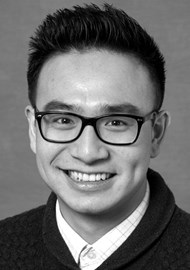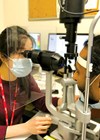Deciding to explore ophthalmology
Having read about ophthalmology, I have always found myself fascinated about what a career in ophthalmology entails. I have often wondered what ophthalmologists actually do, as we as medical students did not have a lot of time in ophthalmology as a specialty. One week learning about eye anatomy and common conditions affecting the eyes was my limit of knowledge.
How I arranged the taster week
I arranged the experience by visiting the Eye Treatment Centre at Whipps Cross University Hospital, and expressed my interest in doing a taster week to one of the consultant ophthalmologists who advised me to contact the consultant in charge of education. I emailed this consultant, who kindly accepted my request and promptly arranged a timetable for me to gain full exposure to the field of ophthalmology.
I discussed my plan to do the taster week with my consultant and clinical supervisor to arrange leave and appropriate cover for my ward.
Experience in taster week
During the taster week, my time was spent between clinics, theatres, teaching sessions and surgical simulation. I sat in clinics with different consultant ophthalmologists specialising in different aspects of the eyes: vitreoretinal (VR) specialists, glaucoma specialists, medical retina specialists and oculoplastic specialists.
In vitreoretinal clinic, I observed the VR specialists assess patients post vitrectomy surgery for retinal detachment, macular hole, and vitreous haemorrhage. In glaucoma clinics, multiple assessments of the patients’ eyes were reviewed to assess the health of the optic nerve and the efficacy of current treatment and the need to escalate treatment plan (e.g., visual field test, optical coherence tomography (OCT) scans, intraocular pressure measurement). In injection clinics, patients with wet age-related macular degeneration (wet AMD) were seen by the medical retina consultant to decide whether they would benefit from anti-vascular endothelial growth factor injection into the vitreous cavity to prevent abnormal growth of leaky blood vessels. In oculoplastic clinics, common problems with the periorbital and facial tissues such as dacryoadenitis (inflammation of the lacrimal glands) / dacryocystitis (inflammation of the lacrimal sac) / cysts / ptosis were seen by the oculoplastic specialists.
I had the chance to attend ophthalmic surgery simulation on the last day of my taster week during which I was shown how to do corneal suturing, how to apply glue to the fix a hole in the cornea, how to place a malyugin ring, and how to perform anterior vitrectomy following posterior capsule rupture during cataract surgery.
I found it fascinating to realise that the eye is such a complex organ that we have sub-specialists for each segment of the eye who dedicate their whole career to learning and treating one small aspect of the organ. I noted the high satisfaction of staff as patients were being treated and given back the gift of vision. It was very inspiring.

Diverse eye problems
My impression in the Eye Treatment Centre was that ophthalmology is a busy specialty with a huge demand for service as it deals with one vital aspect of human health: vision. Patients come to the Eye Centre with a diverse range of complaints ranging from obvious eye trauma to the most obscure macular hole. Patients usually have multiple investigations done (visual acuity test, intraocular pressure measurement, visual fields test, Pentacam, OCT) before seeing the ophthalmologist.
Specific skills and knowledge required
As a junior doctor having worked in many different aspects of general medicine, ophthalmology presents a very different challenge to me. I am totally out of my comfort zone with the use of slit-lamps to examine the eyes, reading and interpreting OCT scans and the complex interplay of miniaturised instruments for ophthalmic surgery. I realised the steep learning curve that ophthalmology trainees must go through to be able to master these new skills that are essential to the practice of ophthalmology.
Exciting specialties with applications of new technology and constant improvement
As a junior doctor with a background in medical physics and biomedical engineering, I have always been fascinated about the use of technology in medicine. During my time in the ophthalmology department, I realised the vital role of medical technology such as OCT, drug delivery systems and novel surgical instruments in the care of eye patients. I believe that in the near future, emerging technologies such as artificial intelligence and big data will further push the boundaries and enable more innovative treatments to be available to improve patients’ care.
A taster week in ophthalmology has certainly given me clarity and cleared my misconceptions about the specialty and it has inspired me to pursue a career in ophthalmology. I would recommend any aspiring ophthalmologist to do a taster week as it has proved to be so beneficial for me in determining my career direction.
COMMENTS ARE WELCOME










